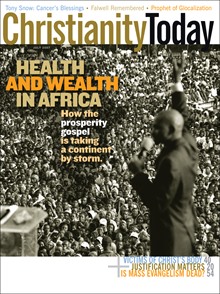Gospel Riches: Africa’s rapid embrace of prosperity Pentecostalism provokes concern – and hope

Christianity Today July 2007
Isaac Phiri and Joe Maxwell, “Gospel Riches: Africa’s rapid embrace of prosperity Pentecostalism provokes concern—and hope” Christianity Today (July 2007), pages 22-29.
Does faith bring wealth? The 2006 Pew Forum on Religion and Public Life study asked if God would “grant material prosperity to all believers who have enough faith” (24). Nearly nine out of every ten Pentecostals in Kenya, Nigeria, and South Africa said yes.1 This cover story in Christianity Today investigates the growing dominance of prosperity teaching as being shared throughout sub-Saharan Africa.
While some African prosperity teachers are given brief quotations, the majority of the article presents a highly critical perspective. Some Pentecostal/charismatic scholars are quoted to offer an overview of the parallel growth of Pentecostalism and prosperity teaching in Africa. However, some of these scholars may take exception to the summary of Word of Faith doctrine and health-and-wealth made in this article.
A direct connection is made from E. W. Kenyon to both the heretical New Thought movement and the Christian Science cult. “By the turn of the 20th century, Essek William Kenyon, a pastor and founder of Bethel Bible Institute, had incorporated similar ideas into his preaching on the finished work of Christ” (25). This ignores scholarship2 that argues Kenyon taught what some believe to be biblical principles that were influenced by the positivism of New Thought but in distinct contradiction to it. A further connection is made between the late Kenneth E. Hagin and Kenyon. The article claims, “Hagin taught Christians they could get rich by mustering enough faith” (25-26), ignoring any Word of Faith teaching that God’s prosperity is grace to be received in every part of life. Although it may be a case of too little too late, Hagin wrote Midas Touch: A Balanced Approach to Biblical Prosperity (Kenneth Hagin Ministries, 2002) before he died to address this kind of abuse. Marginalization and misrepresentation of Word of Faith beliefs does nothing to bring its adherents to conversation regarding what is sound biblical teaching.
J. Lee Grady, editor of Charisma magazine, is quoted as urging discernment when investigating the “strains” of prosperity teaching being preached. “Many of the renewalist leaders in Nigeria preach prosperity as a biblical concept based on the promises of Deuteronomy … proclaiming that when people serve Jesus Christ and renounce other gods, God blesses their nation and economy” (page 24). God is moving, Grady says, despite the greed of some.
The second half of the article considers critics of prosperity teaching from within Africa, and presents a balanced critique of a movement that this article depicts as being out-of-control.
Running along with this article is “First Church of Prosperidad: Arlene Sanchez Walsh on the African-style prosperity gospel right in our backyards—in immigrant Latino churches” (pages 26-27).
Coincidentally, The Christian Century featured a cover story on the same subject. Paul Gifford, an expert in African Christianity, says that growing Pentecostal churches in Africa focus on achieving success. He addresses the tensions that arise when poverty and setbacks to “success” are the daily reality. “Expecting miracles: The prosperity gospel in Africa” The Christian Century (July 10, 2007).
Reading these articles, especially Gifford’s, will broaden and deepen your understanding of Christianity in Africa and how the doctrine of prosperity has been imported there from America.
Reviewed by Raul Mock
Notes
At the time of printing, this article was found online at:
http://www.christianitytoday.com/ct/2007/july/12.22.html
“First Church of Prosperidad” may be found here: http://www.christianitytoday.com/ct/2007/july/13.26.html
“Expecting Miracles” by Paul Gifford may be found at this location: www.christiancentury.org/article/2007-07/expecting-miracles-0
1 Time magazine’s 2006 poll of American Christians had 61% believing that God wants people to be prosperous, and 31% agreed that if you give your money to God that God will bless you with more money. “Does God Want You To Be Rich?” Time (September 10, 2006). http://www.time.com/time/magazine/article/0,9171,1533448-2,00.html
2Two such studies may be found in Geir Lie, E.W. Kenyon Cult Founder or Evangelical Minister? (Refleks Publishing, 2003) and Joe McIntyre, E.W. Kenyon: The True Story (Charisma House, 1997).


